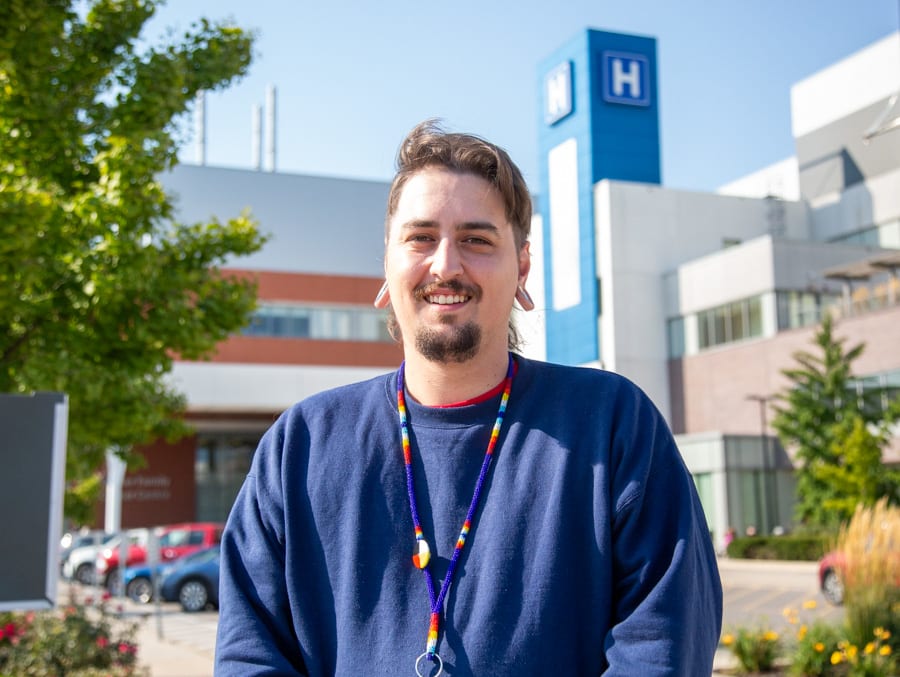We are Niagara Health is a series of stories that celebrates the incredible people working and volunteering in our organization and how they make a difference in the lives of patients and coworkers every day.

Environmental Services Supervisor Isaiah Beardy strives to create a safe space for everyone at Niagara Health to ask questions and feel comfortable.
Isaiah Beardy knows Google isn’t the panacea many think it is when it comes to providing information.
The Environmental Services supervisor has noticed the shortcomings of the search engine when looking up facts about Indigenous Peoples. That’s why he’s happy to fill in any blanks or clarify anything that turns up in someone’s search results on the topic.
And much like with the artificial intelligence powering Google, you can ask Beardy anything. He’s not overly concerned with how you frame the question, either.
“I get asked questions a lot that start with, ‘I don’t want to offend you,’” Beardy says. “You’re not going to offend me unless you’re blatantly offensive. When it comes to the Indigenous community, you can’t find everything on Google so I’m trying to help fill the void.”
Beardy has extensive knowledge to draw upon. His family tree is rooted in the Cree community in what’s known today as Saskatchewan. His ancestors eventually headed east to Ontario for the fur trade, transplanting the Beardy lineage to the Oji-Cree community of Kingfisher Lake First Nation, a fly-in community about 350 kilometres north of Sioux Lookout.
Beardy was born in Tyendenaga, a Mohawk community set between Belleville and Kingston, grew up in Peterborough and summered in Kingfisher Lake before eventually moving to Niagara to attend Niagara College.
“With my family coming from an isolated community, it’s a different culture than what you’d see down here (in southern Ontario),” Beardy explains. “There’s a lot of fending for yourself, hunting your own meat. There aren’t a lot of vegetables so it’s foraging.”
For all the required self-sufficiency, Kingfisher Lake First Nation is a close-knit community where everybody knows each other, he says. That fostered a sense of independence in Beardy that inspired him to move to Niagara -- a place where he had no connections -- to chart his own path.
“The main thing I like bringing forth to my job is being an outlet for people to ask questions without being judged. I’m not afraid of being offended in light of helping people understand.”
After he graduated from college, he was hired by Niagara Health to work as a screener at the Welland Hospital during the pandemic. He spent about a year in that role before taking a post with Environmental Services and working his way up the ranks in St. Catharines and Niagara Falls.
“I moved up quick and I’m grateful,” Beardy says.
But that’s not the only reason he appreciates Niagara Health. There’s a long history of the impact of residential schools on the people of Kingfisher Lake, including Beardy’s family. He’s seen the shortfalls in health services in the remote community and what he describes as “government neglect.”
In contrast, Niagara Health cares about Indigenous Peoples, he says.
“That’s a big thing, just being part of an organization I feel genuinely wants to reconcile,” Beardy says. “A lot of people who work here aren’t scared to put forth the truth and understand the past wasn’t the greatest.”
Enter his willingness to contribute to that by stepping in where Google falls short. Based on the conversations people strike up with him and the questions they ask, Beardy says he sees greater understanding of the history of Indigenous Peoples than ever before, particularly since the truth about residential schools has been exposed.
“The main thing I like bringing forth to my job is being an outlet for people to ask questions without being judged,” Beardy says. “I’m not afraid of being offended in light of helping people understand.”
Take, for example, how to address Beardy. ‘Indigenous Peoples’ has become the umbrella term for the descendants of those who inhabited North America before European colonization. But he self-identifies as Native.
Ojibwe means pucker, in reference to how the ancestors of the people living in Kingfisher Lake tied their moccasins, he says. The Ojibwe are a specific nation of the Anishinaabe.
When it comes to other questions about language, Beardy doesn’t mince words. Truth and Reconciliation Month, which happens every September at Niagara Health and culminates with the National Day for Truth and Reconciliation on Sept. 30, isn’t a celebration, he explains.
“It’s a time to reflect and not necessarily celebrate and people may not realize that,” he says. “It’s a time when Indigenous Peoples want to honour Truth and Reconciliation.”
Beardy creates a safe space for that to happen by wearing a medicine wheel on his beaded lanyard at work. That’s for the curious to recognize him and ask their questions. It’s also to provide comfort to those from Indigenous communities who have to visit the hospital, which he’s equally eager to do.
“Any Indigenous community you come from, it’s going to look different than the St. Catharines Hospital or another Niagara hospital. These are big extravagant buildings and you want to make it feel like home and less overwhelming,” Beardy says.
“I like trying to make their stay at a place they don’t want to be as close to home and as comfortable as can be,” he adds. “That gives me the greatest sense of pride in my work.”

